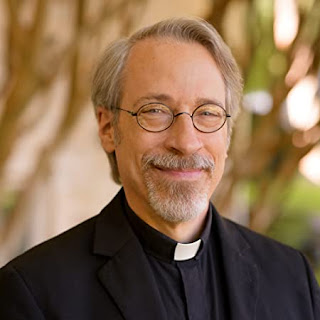Fr. Charles Erlandson is a professor of Church History and Pastoral Theology at Cranmer Theological House. He holds a Ph.D. in Religious Studies from Lancaster University (U.K.)
Alice C. Linsley
In his book, Orthodox Anglican Identity: The Quest for Unity in a Diverse Religious Tradition, Fr. Charles Erlandson explores orthodox Anglican identity in the context of an ongoing identity crisis within the global Anglican Communion. Erlandson recognizes that Anglicanism is “a microcosm of the entire Christian church,” because its identity reflects its diversity. He notes that religious traditions are not immune to identity crises, and orthodox Anglicans have been struggling to define their identity since the 2003 consecration of V. Gene Robinson, a partnered homosexual.
The Anglican Communion is a theological mutt with adherents who identify as Protestant, Reformed, Catholic, Evangelical, Rationalist, Empirical, and Mystical. If you seek an Anglican religious identity, you can find it here.
Reformed Catholicism can be experienced in parishes of the Anglican Province of America, The Anglican Catholic Church, The Anglican Church in North America, The Traditional Anglican Church, and The Orthodox Anglican Church. They uphold catholic doctrine and discipline, hold a high view of the sacraments, and have male priests only.
Revisionists are comfortable in most Episcopal churches where theology and practice accommodate contemporary culture and resource in Modernism. Though some of the leaders of liberal revisionism have died - Louie Crew, John Spong, and Desmond Tutu - the Episcopal Church, the Church of England, the Anglican Church of Australia, and the Anglican Church of Canada are largely allied in this innovative Anglican identity with its acceptance of women priests and same-sex unions.
Evangelical Anglicans in America find a place of comfort in most parishes of the Anglican Church of North America (ACNA). Some of their heroes - John Stott and J. I. Packer – also have passed to their reward, but their legacy remains strong among the Evangelical Anglicans globally. Charles Erlandson is among the rising Evangelical Anglican voices.
Some Evangelical Anglicans identity themselves as “Protestant” while others prefer the term “Reformed.” In my thinking, "Protestant" refers to Christian denominations that emerged after the Continental Reformation. These groups are removed from catholicity. They claim Sola Scriptura, ignoring the fact that the Scriptures themselves reflect a very ancient Messianic tradition. While Scripture is said to be their foremost authority, they invent doctrines that do not align with the whole counsel of Scripture: Young Earth Creationism, Antinomianism, Preterism, Pentecostalism, and the Rapture.
American Protestants show evidence of being confused about the substance of the Gospel, often posing it as a self-help message, a higher moral code, or an enlighten ethics. I rarely hear Protestants speak about the Trinity and the two natures of Jesus Christ.
They ignore the seasons of the Church year and rush to Christmas and Easter celebrations without periods of preparation. Most deny the sacramental nature of Baptism and Holy Communion, and the very ancient office of priest is disdained.
The Communion of Saints appears to be a foreign concept to Protestants. That the justified living and the justified at rest are united in Christ and not separated by death is regarded by some as heretical. The iconoclastic Puritans under Cromwell did a great deal of damage and in that same spirit, many Protestant churches do not have a cross in the sanctuary.
The Incarnation is barely spoken of, and the veneration of the Blessed Virgin Mary is generally misunderstood and usually misrepresented as idolatry. This reveals how poorly most Protestants understand Genesis 3:15 and other biblical references to the promised “Seed” or Son of God.
The attitude of "reformed and always reforming" leads to continual efforts to update worship, preaching styles, and congregational structures to make them relevant. This expresses itself in contemporary praise band music, largely passive audiences, a consumer mindset, and sermons that tickle the ears.
A 2019 Pew Research Center survey found that “only half of Millennials (49%) describe themselves as Christians; four-in-ten are religious ‘nones,’ and one-in-ten Millennials identify with non-Christian faiths.”
As Gracey Olmstead wrote in a 2014 article that appeared in the American Conservative: “America’s youth are leaving churches in droves. One in four young adults choose ‘unaffiliated’ when asked about their religion, according to a 2012 Public Religion Research Institute poll, and 55 percent of those unaffiliated youth once had a religious identification when they were younger. Yet amidst this exodus, some church leaders have identified another movement as cause for hope: rather than abandoning Christianity, some young people are joining more traditional, liturgical denominations—notably the Roman Catholic, Anglican, and Orthodox branches of the faith. This trend is deeper than denominational waffling: it’s a search for meaning that goes to the heart of our postmodern age.”
It appears that the search for meaning has turned some from shallow and enculturated Christianity to the sacred mysteries experienced only through the full sacramental life of the Church. They want to belong to the "one, holy, catholic, and apostolic" Church.
At least there is a consensus today among Anglicans that the Bible, the Book of Common Prayer, and the Articles of Religion constitute essential characteristics of Anglicanism. One answer to the question "What is an Anglican" was given in an address at Canterbury House in Dallas by George Sumner: "In fact the most concise and compelling answer to the question What is an Anglican? is a prayer book Christian." Most would also agree on the necessity of the priesthood and the importance of Apostolic Succession. In that, we have made progress since the 19th century.
In his 1866 treatise “Catholic Orthodoxy and Anglo-Catholicism”, the English Churchman Julian J. Overbeck wrote: "First of all, what is the Anglican Church? The definition is more than difficult. For if I say, it is that Christian Denomination, the basis of which is the Bible, the Prayer-book, and the Thirty-nine Articles, at once the Evangelical party will rise and cry: "The Bible, and the Bible only is our foundation. We disapprove a great deal of what the Prayer-book retained from Popery. No Ritualism, no Sacerdotalism! No sham of Apostolical Succession! We all are priests. There is no Hierarchy divino jure, clergymen and laymen are not essentially different, there is only a distinction for order's sake.”
The Limits of Sola Scriptura
Having experienced different cultures while living abroad, and after teaching for many years in Protestant institutions, I could not embrace the trappings of Protestant enculturated religion or fully ascribe to the doctrine of Sola Scriptura.
The Reformers themselves recognized the limits of Sola Scriptura. The original intent was to assert that the Bible is the final and infallible authority and arbiter, rather than the Pope, the Roman Catholic Magisterium, or ecclesial councils. The doctrine upheld the role of reason in understanding what is clearly stated in Scripture concerning “all things necessary for salvation.”
Martin Luther placed the authority of the Bible over the authority of the Roman Catholic Church. He stated that "a simple layman armed with Scripture is greater than the mightiest pope without it". Luther recognized that some biblical texts are difficult to understand, and he attempted to elucidate these in his sermons.
The 1646 Westminster Confession of Faith (Chapter 1, Section VII) spoke of "the ordinary means" used to understand Scripture and these include turning to learned pastors and teachers. “All things in Scripture are not alike plain in themselves, nor alike clear unto all; yet those things which are necessary to be known, believed, and observed, for salvation, are so clearly propounded and opened in some place of Scripture or other, that not only the learned, but the unlearned, in a due use of the ordinary means, may attain unto a sufficient understanding of them.”
Luther’s intention was to correct abuses that arose in the Medieval Church. He clearly did not deny the role of tradition as he observed many practices such as oracular confession and the veneration of the Virgin Mary.
Today we approach the Bible less polemically. We can understand difficult passages because of the work of learned Bible scholars, textual criticism, biblical archaeology, biblical anthropology, and the study of biblical languages and biblical populations. Today the available “ordinary means” are vastly greater and more diverse.
Nevertheless, the attitude of many to church authority is indifference, and traditions, especially those regarded as “Christian” are disdained. The cultural context of our day is very different from that of the Reformers. We are heirs to the empiricism of the 20th century, and we can legitimately draw on that heritage when investigating the Scriptures as objectively as possible. As Francis Bacon reminds us, “Prudent questioning is one half of knowledge.”
The Anglican Way relies on the faculty of reason in opposition to sensation and emotion. It is a reasonable faith that finds expression in the works of great thinkers such as Anselm of Canterbury, Richard Hooker, and John Keble. Empiricism flourished in the British Isles among members of the Church of England, and though British Empiricism took an anti-Church turn, it owes much to the Anglican intellectual environment.
Those Anglicans who hold the Bible as a first authority and those who hold Scripture and Tradition together are obligated to read it thoroughly and regularly. Daily reading of the Bible characterizes The Anglican Way. It is a fundamental spiritual obligation that pertains to all Anglicans regardless of how they self-identify.
I am not advocating return to the Bible as the remedy for all conflict within the Anglican Communion. That would be as reductionist as the reductionism I object to in Protestantism. Rather, I believe that the Bible informs the mind and shapes the inner person; that it is a book that profoundly changes people. We will never change the Anglican Communion, but the Holy Spirit changes people who read the Bible, and changed people form a more perfect union. Dostoevsky was converted in a Siberian prison after reading the only book he was allowed: the New Testament.
Related reading: Review of Erlandson's Book; Anglican Communion in Crisis; Anglicans Divided






